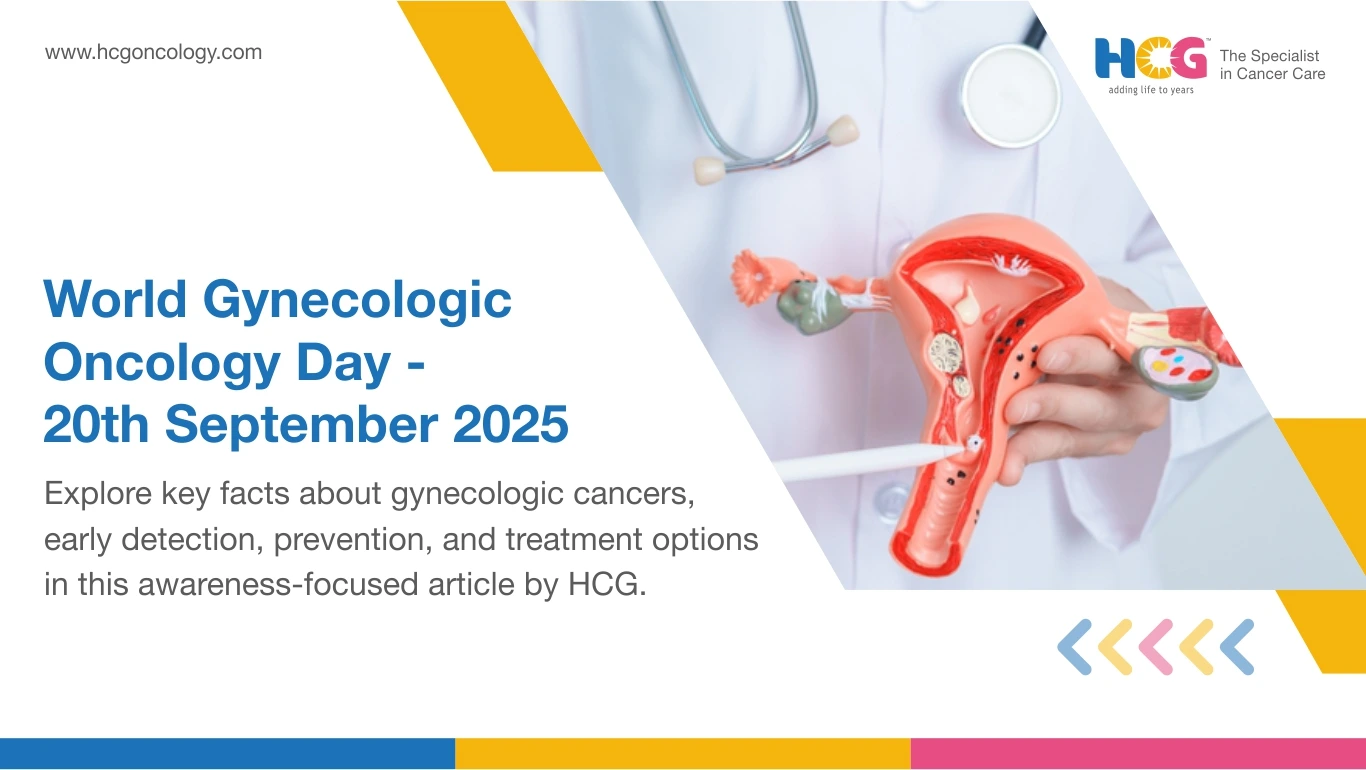
19 Dec, 2025
Feel free to reach out to us.

19 Dec, 2025
.jpg)
This article is medically reviewed by Dr. Nidhi Gupta, Consultant - Gynecologic Oncology, HCG Aastha Cancer Centre, Ahmedabad.
World Gynecologic Oncology Day (World GO Day) is observed on September 20 every year. It helps to raise awareness about various gynecological cancers, such as uterine, ovarian, vaginal, cervical, and vulvar cancers.
Screening, early detection, personalized treatment, and preventive measures are the critical aspects that are shed light on during World Gynecologic Oncology Day observance.
Healthcare professionals also play an important role in sharing knowledge about gynecological cancers and encouraging routine screenings. Various activities are planned on the World Gynecologic Oncology Day to improve community engagement and reduce stigma surrounding the disease.
Know more about other cancer awareness observances in September: Cancer Awareness Month September 2024: Significance, Symptoms & Treatments
Gynecologic cancers, or gynecological cancers, refer to the cancers that arise from various organs of the female reproductive system, such as the uterus, cervix, vagina, ovaries, and vulva.
Common symptoms of gynecologic cancers are pelvic pain, abnormal bleeding, or changes in bowel or urinary habits.
Several factors, such as family history, human papillomavirus (HPV) infection, obesity, age, and hormonal alterations, increase the risk of gynecological cancers. Routine screening ensures early diagnosis and timely treatment.
Some of the advantages of raising awareness about gynecologic cancers during World GO Day include:
Some of the most common symptoms of gynecological cancers are:
Prevention or early detection of gynecological cancers can be achieved through:
Gynecologic cancers are best managed with personalized care, which may or may not include more than one treatment approach. Different treatment options available for gynecological cancers include:
There are several ways through which you can get involved in raising awareness. You may join the walks or seminars to improve your understanding. You may also share the information on the community platforms or social media.
You can also raise funds to support research and patient care programs. Encourage the women in your family and female friends to undergo regular screening for gynecological cancers.
You may also provide emotional support to the patients and survivors, thereby reducing the stigma and encouraging open discussions.
HCG Aastha Cancer Centre is a dedicated, comprehensive cancer centre in Ahmedabad, offering comprehensive cancer care services. The hospital offers all major services, including screening, diagnostics, treatment, follow-up, psycho-oncology counseling, supportive care, and more.
The following are key reasons why you should choose HCG Aastha for gynecological cancer treatment:
Every year, 20 September is observed as World Gynecological Oncology Day. Gynecological cancers are the cancers that develop in the organs of the female reproductive system. These cancers involve vaginal, vulvar, ovarian, cervical, and uterine cancers. Some of the common symptoms include pelvic pain, abdominal swelling, unexplained weight loss, and abnormal bleeding. You may participate in the World Gynecology Oncology Day by raising awareness, volunteering to raise funds, and providing emotional support to those affected by gynecological cancers.
.jpg)
Dr. Nidhi Gupta
Consultant - Gynecologic Oncology
MBBS, MD, Fellowship in Gynec Oncology, FMSKCC (USA)
Dr. Nidhi Gupta is a seasoned gynecologic oncology consultant with over 7 years of experience in treating and managing different types of gynecological cancers. She is available for consultations at HCG Aastha Cancer Centre, a well-known cancer hospital in Ahmedabad. She specializes in diagnosis, preoperative evaluation, and postoperative care. Dr. Nidhi Gupta excels at simple to complex cancer management strategies. Her expertise lies in partial or complete removal of the organ, lymph node dissection, cytoreductive surgery, HIPEC, and more. She specializes in both open and minimally invasive surgeries, such as laparoscopic surgery and robotic surgery.
She prioritizes the well-being of her patients and practices evidence-based medicine and follows widely accepted guidelines to deliver the best possible care to her patients.
Appointment Link: Book an Appointment with Dr. Nidhi Gupta.